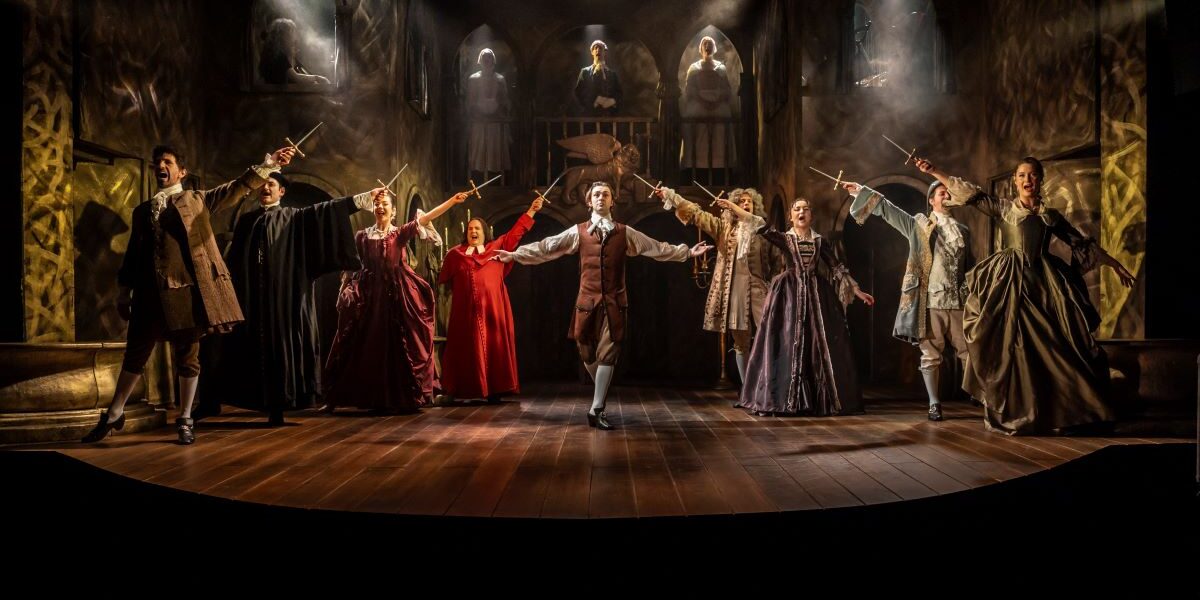Stiletto is set in the Venice of the 1730s, the era of Casanova and Canaletto. While there is certainly glamour and swagger aplenty, here the focus is on castrati. Marco Borroni was deprived of his masculinity as a child, as was the custom to preserve the purity of the male treble voice into adulthood. For a lucky few a celebrity lifestyle beckoned through aristocratic patronage and opera stardom, and the musical sets out such a pathway. We meet Marco as he transitions from a star pupil through to the plaything of a bored aristocratic hostess. Initially ambitious, he makes the mistake of befriending Gioia, a talented singer, who as a woman and daughter of slaves has a double barrier in the way of her talent. Complicated plot twists ensue to keep them apart, referencing financial corruption and false accusations of murder, before romance finally prevails.
Visually this show is a feast. A lot of money has gone into both glimmering sets and glittering costumes. There is a also a substantial orchestra in the balcony of the set which generates a lavish sonic palette, gilding the music with a veneer that elevates it further than it deserves. However, in other key respects this musical falls short of expectations. The book and lyrics are often clunky and clumsy especially in the more romantic scenes. This undermines character development and plausibility to the point that audience members around me were giggling at the bathos. You had to feel for the actors and singers at moments such as this. Moreover, there is simply a larger implausibility when you have Jack Chambers, a tenor, playing Marco, and a mezzo soprano, Jennie Jacobs, emerging to simulate the big castrato numbers.
The music also misses a few tricks too. I was expecting some impressive eighteenth-century pastiche numbers, especially given the highly capable band. But there was little of this, and more of a bland rock-pop vibe. Matthew Wilder is best at depicting character – the songs in which the subordinate characters introduce themselves or comment on the action have bite and purpose and dramatic grip – both Sam Barrett and Greg Barnett as Luigi and Conti, had good moments in this regard. There are also some excellent performances elsewhere. Kelly Hampson as Azurra, the presiding patron, sings gloriously and maintains her dignity impeccably in the face of some risible dialogue. Jewelle Hutchinson, whom I last saw performing with distinction at Chichester, likewise makes a strong vocal impact, despite the role of Gioia being somewhat underwritten. Jack Chambers has some moments of strain but otherwise makes a pleasing impression in the lead role, and Connor Wood, as a loyal friend traumatised into muteness, memorably finds his voice near the end.
Overall, there is a lot of talent on show here, and some incisive direction especially in the chorus numbers; but it is dissipated by the disappointing text which ensures that the central characters fail to come to three-dimensional life. There is a promising concept therefore, but it needs a lot more work to bring it to the point where you feel the need for words to move into music that is essential to any show of this kind.
Music & Lyrics: Matthew Wilder
Book: Tim Luscombe
Director: David Gilmore
Cast includes: Sam Barrett, Greg Barnett, Jack Chambers, Kelly Hampson, Douglas Hansell, Jewelle Hutchinson, Connor Wood
Until 14 June 2025
2 hrs 15 mins with interval
Photo Credit Johan Persson

